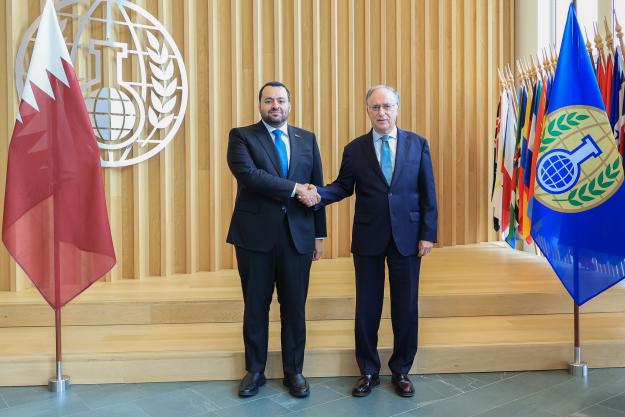
H.E. Dr Mohammed bin Abdulaziz Al-Khulaifi, Minister of State of Qatar, and Ambassador Fernando Arias, OPCW Director-General.
THE HAGUE, Netherlands—26 September 2025—The Director-General of the Organisation for the Prohibition of Chemical Weapons (OPCW), Ambassador Fernando Arias, met with Qatar’s Minister of State, Ministry of Foreign Affairs, H.E. Dr. Mohammed bin Abdulaziz Al Khulaifi, on 18 September at the OPCW’s Headquarters in The Hague.
During the meeting, Director-General Arias and Minister of State Al Khulaifi discussed current affairs, including the situation in the Syria Arab Republic, with a focus on the challenges associated with fully eliminating Syria’s chemical weapons programme. Both parties reaffirmed their shared commitment to the OPCW’s mission and the collective goal of achieving a world free of chemical weapons.
Minister of State Al Khulaifi stated: “I was pleased to meet with the Director-General of the OPCW, where we held a constructive meeting to discuss ways of strengthening cooperation between Qatar and the OPCW, in support of its objectives and the implementation of the Chemical Weapons Convention (CWC). We also commend the continued efforts of the Director-General and the Technical Secretariat in addressing the Syrian file. Qatar reaffirms its unwavering commitment to supporting the Organisation and actively contributing to its work as a responsible and dedicated State Party.”
The Director-General stated: “I wish to express my sincere gratitude to the State of Qatar for its sustained political support to the Organisation. I commend Qatar’s constructive assistance in advancing our works in eliminating Syria’s chemical weapons programme, including its fundamental role representing the interests of the Syrian Arab Republic before the OPCW since January this year. This valuable cooperation will further strengthen our joint efforts to bring to a close the longstanding Syrian chemical weapons dossier.”
The OPCW Director-General noted: “It is clear that the tasks ahead are more complex than those undertaken 11 years ago during the destruction of Syria’s declared chemical weapons programme. Significant challenges remain, and consistent, practical support from the international community—such as that provided by Qatar—will be essential to achieving the complete and irreversible elimination of Syria’s chemical weapons programme.”
Director-General Arias also commended Qatar’s continuing active support to the OPCW. He emphasised, “Efforts made by Qatar, including co-hosting the Annual Meeting of Representatives of the Chemical Industry and National Authorities of States Parties to the Convention, have contributed to strengthening global chemical security and advancing non-proliferation.”
Background
Qatar has been an active member of the OPCW since the Chemical Weapons Convention entered into force in 1997. Qatar is a member of the Executive Council, the OPCW’s executive organ, which is responsible for promoting the effective implementation of and compliance with the Chemical Weapons Convention as well as supervising the activities of the Organisation’s Technical Secretariat.
Following the fall of the former government in the Syrian Arab Republic on 8 December 2024, since January 2025, Qatar has represented the Syrian Arab Republic at the OPCW. The Technical Secretariat is working closely with the new Syrian authorities and Qatar to address outstanding issues related to Syria’s chemical weapons dossier and has deployed four missions to the country this year with full cooperation from the Syrian side. Further deployments are being prepared.
During the deployment that took place in April, the OPCW collected three samples at one of the visited locations. The OPCW has reported that the analysis of these samples conducted by OPCW designated laboratories revealed indicators of nerve agents. The OPCW has shared the results with the Syrian authorities and intends to address the issue in subsequent deployments. Read the report.
The Annual Meeting of Representatives of Chemical Industry and National Authorities of States Parties to the Chemical Weapons Convention provides an opportunity for National Authorities and the chemical industry to enhance their coordination and collaboration in effectively implementing the CWC, and how they can collaborate to achieve these goals.
As the implementing body for the Chemical Weapons Convention, the OPCW, with its 193 Member States, oversees the global endeavour to permanently eliminate chemical weapons. Since the Convention’s entry into force in 1997, it is the most successful disarmament treaty eliminating an entire class of weapons of mass destruction.
In 2023, the OPCW verified that all chemical weapons stockpiles declared by the 193 States Parties to the Chemical Weapons Convention since 1997 — totalling 72,304 metric tonnes of chemical agents — have been irreversibly destroyed under the OPCW’s strict verification regime.
For its extensive efforts in eliminating chemical weapons, the OPCW received the 2013 Nobel Peace Prize.
